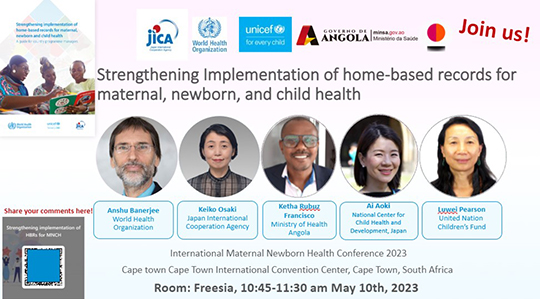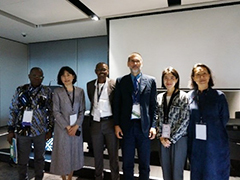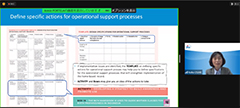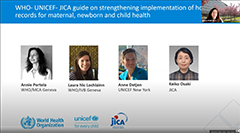Launch of "Strengthening Implementation of Home-based Records for Maternal, Newborn and Child Health" at Quality of Care Network Webinar and International Conference (IMNHC 2023)
Day:2023.05.10
event |
Date: April.20th, 2023 (Webinar), May.10th, 2023 (IMNHC)
Sponsors: JICA, UNICEF, WHO
Location: Online and Capetown, South Africa

IMNHC Flyer
[Webinar]
Anayda Portela (WHO)
Laura Nic Lochlainn(WHO)
Anne Detjen (UNICEF)
Keiko Osaki (JICA)
[IMNHC]
Keiko Osaki(JICA)
Anshu Banerjee(WHO)
Ketha Francisco( Angolan Ministry of health)
Ai Aoki (Center of Child Health and Development)
Luwei Pearson (UNICEF)

Panelists at IMNHC
Home-based records are a people-centered tool for ensuring a quality continuum of care for maternal, newborn and child health. Despite the wide use of home-based records, implementation challenges persist, such as stock-outs, incorrect use of home-based records by health workers or low retention by women, parents and caregivers that impede the home-based record's potential. World Health Organization (WHO), United Nation Children's Fund (UNICEF)and Japan International Cooperation Agency (JICA) have recently published a guide to strengthen the implementation of home-based records for maternal, newborn, and child health (the Guide). The Guide was developed in response to the common implementation issues faced by country programmes and seeks to provide decision-making tools and activities, links to existing resources and examples from countries that can be used to strengthen processes for planning, design, implementation and monitoring of home-based records. To make global partners familiar with the Guide for strengthening implementation of home-based records, it was officially launched through two major global gatherings: Quality of Care (QoC) Network Webinar (online, April 20), and International Conference (The International Maternal Newborn Health Conference: IMNHC 2023, Cape Town, May 10) with a total of more than 400 participants from 80 countries.

Ms.Osaki (JICA) at QoC Webinar
At QoC Network Webinar, Anayda Portela and Laura NIC LOCHLAINN of WHO, Keiko Osaki of JICA, and Anne Detjen of UNICEF explained the objectives, structure, and contents of the Guide. On behalf of Ghana Health Service, Catherine Adu-Asare shared their experiences and lessons learned in implementation of the MCH Record Book in Ghana. Lora Shimp of John Snow Inc. also presented on different scenarios where the Guide would be useful. Both partners expressed the importance of the Guide. Several questions were posed from participants on cost-effectiveness, monitoring of implementation, leadership of governments, and digitization of home-based records.
At IMNHC 2023, held in Cape Town, South Africa, about 1,800 people gathered. Keiko Osaki of JICA introduced the importance of ensuring voices of key users of home-based records are heard to enhance the implementation of home-based records to benefit key users. Anshu Banerjee of WHO announced the official release of the Guide and briefly explained who the intended audience for the Guide, its structure, and key content. Ketha Francisco of the Ministry of Health of Angola described Angola's experience with the pilot implementation of the Maternal and Child Health Handbook according to the structure of the Guide and the lessons learned along with the successful factors that in the Guide indicates. Ai Aoki, of the Center of Child Health and Development, Japan, presented the possibility of using implementation research to enhance planning and monitoring and using the Angola case . Participants posed questions about the selecting content for home-based records, the role of community health workers, and implementation research. In closing, Luwei Pearson of UNICEF noted the importance of empowering people and integrating care with quality, and for these reasons, it is important to strengthen implementation of the home-based records.
These two sessions served to introduce a brief overview of the Guide and stimulate interest from the participants. As the Guide is a living document, countries and global partners are invited to use it and send feedbacks. JICA, UNICEF, and WHO will continue to be committed to this effort driving collaboration, coordination, and cross-country learning.

Presenters at QoC Webinar
scroll